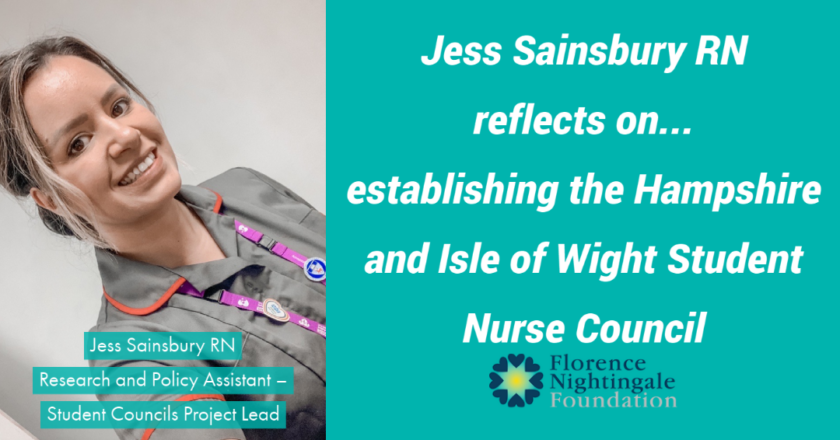
As the Health Education England South East Student Councils Programme is launched, I’d like to reflect on where the idea came from and the importance of co-production. To find our more information about the project and details on how to apply, please visit here.
Rewind to July 2019 when I walked into St. Mary’s Football stadium with my arms full of RCN Students #FundOurFuture paraphernalia accompanied by fellow nursing student Dana. I don’t think either of us realised at the time what we were walking into; we simply thought this was a fancy three day Hampshire and Isle of Wight (HIOW) System event and they needed some students to tick a box. How wrong we were.
Over those three days we were both encouraged to contribute to discussions and planning as equals alongside Chief Nurses, Directors of Nursing, senior Educators, and established Nurses from across HIOW. This included collaborating on ideas to improve the nursing workforce pipeline and one of those ideas was to create a Student Nurse Council for the System.
Why did we need this? It was acknowledged that many of the senior leaders were not aware of the struggles and general experience of students who were undertaking clinical placements in the HIOW System. They were shocked to hear stories of students having to rent camping pitches because they couldn’t afford the initial double outlay for accommodation for placements that were too far to commute to. We were missing a consistent and strategic student voice at a System level, while acknowledging the importance of local academic representation systems and trade union student representatives.
After the event, several local listening events were facilitated by Chief Nurses as well as a tweetchat in order to hear from as many current and future nurses as possible. Fast-forward to July 2020 and the first meeting of the HIOW Student Nurse Council was taking place.
Over the coming months, this group of nursing students worked with Health Education England South East (HEE SE) and many nursing stakeholders across HIOW, setting objectives for the Council and influencing not only individuals but key system projects such as placement capacity expansion and the #WeAreTheNHS campaign. During this time Council Members and those who supported them had raw and authentic discussions about topics such as equality, diversity and inclusion – challenging each other’s views but working together as a team to come to common understandings.
A key moment during the first twelve months of the HIOW Student Nurse Council was in January 2021; the Nursing and Midwifery Council (NMC) announced that the Emergency Education Standards were available for use but it was the decision of local areas whether they would choose to re-introduce paid clinical placements in response to the ongoing pandemic. Nursing Leaders in HIOW consulted with the HIOW Student Nurse Council who, following discussions with peers, wrote an open letter to the Nursing Leaders urging them to continue with nurse education as normal as they feared further disruption may have negative consequences on these cohorts as their education had already been disrupted in 2020. The Nursing Leaders listened to the student voice and did not implement the NMC Emergency Education Standards in January 2021.
There are many examples of the influence and impact that the HIOW Student Nurse Council have had both locally and nationally and these will be shared. However, they will be shared from the student nurses involved themselves – it is their story after all.
But for now, due to the success of the HIOW Student Nurse Council, HEE SE have provided funding to upscale this initiative establishing six multi-professional Student Councils, one per Integrated Care System (ICS) across the South East region of England. With 12 seats available for each ICS Student Council, resulting in 72 new and unique leadership opportunities for students to influence senior healthcare leaders. Students will hold Student Council Member positions for up to 12 months and work with University and Practice Providers in their ICS to set the direction of the Council with clear objectives. In addition, the students will be fully supported by the Workforce Transformation Team at HEE SE alongside the Florence Nightingale Foundation with a full induction programme, reverse mentoring, and a three-day bespoke leadership programme as part of their preparation for the role.
Acknowledging the realities of life as a student healthcare professional, showing commitment to valuing the voice of students, and further to discussions with the Nursing and Midwifery Council and the Health and Care Professions Council, Student Council Members are able to be remunerated on a monthly basis or receive clinical placement hours (with prior support from their University).
Now in Autumn 2021 as a Registered Nurse leading on this project, I recognise the importance and value of not only student advocacy but collaborative working. If those Nurse Leaders at St. Mary’s did not listen to the nursing students in front of them, we would not be recruiting for this opportunity today.
A special thanks to Sue Hill, Senior Nurse at HEE SE, Jackie Munro, Chief Nurse at Solent NHS Trust, and Ian Winkworth, Programme Lead Adult Nursing at the University of Winchester, for believing in and celebrating the future workforce.